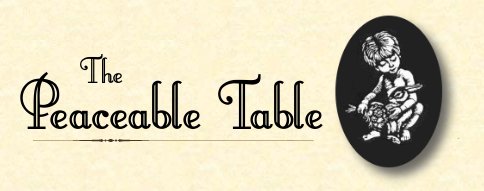Editor's Corner: With an Act of Pity
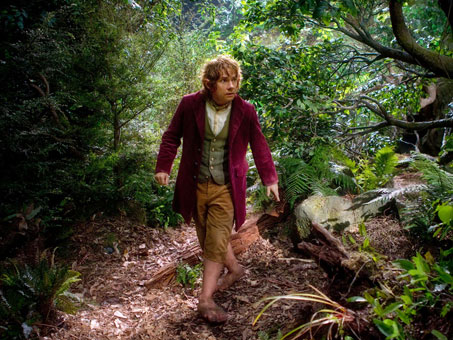
In the second chapter of Tolkien's The Lord of the Rings, Gandalf the wizard tells the hobbit Frodo the story of how the perilous One Ring, the Ring of Power made by Sauron the Evil One, came into his (Frodo's) possession. Centuries earlier, after the Ring had lain for long years in the bed of the river Anduin, a proto-hobbit named Deagol found it while fishing on the river. Almost at once his companion Smeagol, caught up in the Ring's powerful lure, strangled him and took the treasure for himself. The Ring gives its owner invisibility when worn, and long life, but corrupts his (or her) mind. And because Smeagol took possession by an act of violence, his corruption proceeded rapidly and ran deeply. Soon hopelessly addicted, he became deceitful, rapacious, violent, devoured from within and unable ever to satisfy his ravenous psychospiritual hunger. Hating the sunlight, Smeagol lived wretchedly and endlessly in a cave under the mountains, eating fish and an occasional goblin he had strangled.
Bilbo's Pity
The next movement in the Ring's journey happened when Bllbo, Frodo's uncle, became separated from his traveling companions and lost in that same cave. While crawling down a tunnel in darkness, seemingly by a wild chance he put his hand on a ring, and pocketed it. Soon he encountered Smeagol/ Gollum,
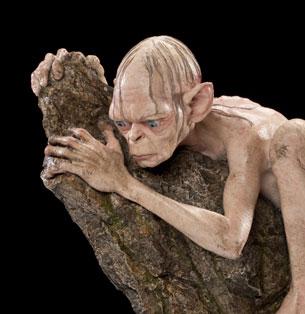 (still
unaware of having lost his
Precious), who
engaged him in a high-stakes game of exchanging riddles: if
Smeagol wins he will kill and eat Bilbo; if Bilbo wins, Smeagol will
show him the way out of the cave. Bilbo did in fact win.
He followed Smeagol down a tunnel toward a back entrance, but when they
were in a narrow place not far from the exit, Gollum, with no intention
of
keeping his agreement, crouched
down in ambush. But
Bilbo, invisible with the Ring on his finger, saw what was
happening. He was tempted to save himself by killing Gollum with
his sword. But filled with a sudden wave of pity for the
ruined,
wretched
creature, he instead took the great risk of leaping over him.
After a further adventure with goblins near the entrance, he escaped.
(still
unaware of having lost his
Precious), who
engaged him in a high-stakes game of exchanging riddles: if
Smeagol wins he will kill and eat Bilbo; if Bilbo wins, Smeagol will
show him the way out of the cave. Bilbo did in fact win.
He followed Smeagol down a tunnel toward a back entrance, but when they
were in a narrow place not far from the exit, Gollum, with no intention
of
keeping his agreement, crouched
down in ambush. But
Bilbo, invisible with the Ring on his finger, saw what was
happening. He was tempted to save himself by killing Gollum with
his sword. But filled with a sudden wave of pity for the
ruined,
wretched
creature, he instead took the great risk of leaping over him.
After a further adventure with goblins near the entrance, he escaped.Eventually reaching his home and resuming his comfortable life there, Bilbo reached his 111th birthday with little sign of aging or being corrupted by the evil power of the Ring. He decided to go off and live with his friends the Elves, leaving his home to Frodo. At Gandalf's urging, he included the Ring in this legacy--though it cost him a struggle. We are told that he was the only person in the Ring's history to give it up voluntarily.
Gandalf's Pity
Bilbo would not have given Frodo the Ring if he had realized that it would put Frodo in deadly danger. But Gandalf' tells Frodo what he has recently learned: thanks to Smeagol's later misadventures, the Evil One now knows that a hobbit named Baggins has the Ring; and that he is putting out all his power to find and get it back The news terrifies Frodo. Frantically he says "'What am I do do? What a pity that Bilbo did not stab that vile creature, when he had a chance!'" But Gandalf demurs. "'Pity? It was Pity that stayed his hand. Pity, and Mercy: not to strike without need. And he has been well rewarded. Be sure that he took so little hurt from the evil, and escaped in the end, because he began his ownership of the Ring so. With Pity.'"
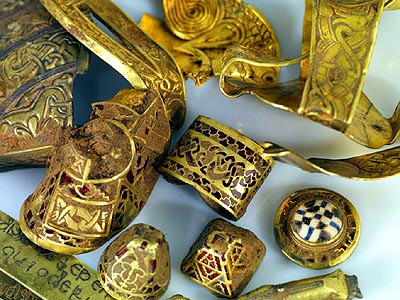
Middle Earth, like the Anglo-Saxon culture upon which it was partially based, is a world alive with extraordinary powers. Magic spells were uttered over the forging of wands, swords, special rings, or important entrance doors, giving the owners or users enhanced powers. In the case of Sauron's One Ring, this includes the invisibility it bestows upon its wearer, but this capacity is due to the Ring's causing him or her to exist half in the world of dark spirits (and to become vulnerable to them.) It is no wonder that taking possesion of it with an act of violence has such terrible effects.
Into the Light of Common Day?
Our Western postmodern world is not one in which one expects to find such conceptions and powers taught in universities. However, there are subcultures flourishing among us whose members--some of them highly sophisticated scholars--hold worldviews with similarities to Middle Earth. Some assert that psychically gifted persons can hold an object such as a garment or ring, and receive impressions about former wearers of the object; their good or evil tendencies, their experiences. Reports of their work may include verifiable information. Until one has studied the extensive evidence and scholarship parapsychology as amassed on this issue, it is not justifiable to dismiss such ideas, including the idea that even in our world, taking possession of something with an act of pity may have a quasi-magical protective effect, either marked or weak, on its possessor, just as a contrasting act of violence may have a corrupting effect.
But the issue does not depend wholly on whether or not magical-type powers and influences exist in our world. An act of kindness tends to make the doer a kinder person, just as the opposite act tends to make one more calloused and accepting of violence. It is eminently worthwhile for us to practice pity and kindness for our own sakes, as well as for the sake of the needy and vulnerable beings we encounter.
The Powerful and the Powerless
The word pity does not have the positive associations it probably had in the more socially stratified societies of past centuries. The word implies that the person acting is in a position of power, and the recipient relatively powerless; to be pitied is to "ask for directions" writ large. The same is true of mercy, and probably even of compassion, although the lastnamed word means "suffering-with," and in itelf has nothing to do with power or powerlessness. But the bad press of pity and its synonyms is unfortunate, and not really necessary. It is possible for a person to be pitiable in a particular area of life, but to be strong and even enviable in other ways.
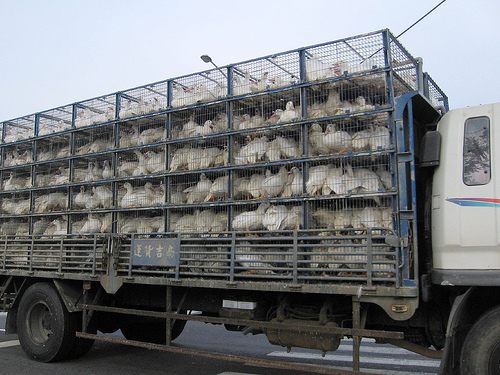 In regard to farmed and laboratory
animals, however, there is no
question but that pity,
mercy, and especially compassion--imagining ourselves in those cages--
are very much in order, and that vulnerable
animals
will not resent them. Anyone, whatever her or his
life circumstances, who has driven behind a truck
crammed with animals enroute to the slaughterhell knows at once that
s/he has enormous power compared
to these enslaved, doomed beings, guilty of nothing except being who
they are. Then why not respond with pity? Many people in
this situation probably do, at least temporarily.
But if they are going home to a dinner centered on a piece of flesh,
they will probably forget pity as soon as the truck is out of sight.
In regard to farmed and laboratory
animals, however, there is no
question but that pity,
mercy, and especially compassion--imagining ourselves in those cages--
are very much in order, and that vulnerable
animals
will not resent them. Anyone, whatever her or his
life circumstances, who has driven behind a truck
crammed with animals enroute to the slaughterhell knows at once that
s/he has enormous power compared
to these enslaved, doomed beings, guilty of nothing except being who
they are. Then why not respond with pity? Many people in
this situation probably do, at least temporarily.
But if they are going home to a dinner centered on a piece of flesh,
they will probably forget pity as soon as the truck is out of sight. Seeing and Pitying
Frodo initially responds to Gandalf's objection in a similar way, though his motivation differs. "I am sorry," said Frodo. 'But I am frightened; and I do not feel any pity for Gollum.' 'You have not seen him,' Gandalf broke in. 'No, and I don't want to,' said Frodo. Much later, on the gruelling journey to Mordor to destroy the Ring, Frodo does see Gollum, who has been following them with greed and murder on his mind, When Frodo and his companion Sam capture the evil creature, Sam is the one who is all for killing him in the name of safety. But Frodo remembers his earlier conversation with Gandalf, and realizes that Gandalf, and Bilbo, were right. '"For now that I see him, I do pity him." Although killing Gollum seems the only safe thing to do, Frodo refuses to consent.
Because for many people, to see the extent of another's suffering really is to pity (at least for a time), animal activists today, like those fighting human slavery two hundred years ago, have labored to gather and present the painful facts and images to the public who buy the products. And not only do they publicize the terrible truth, they offer action that people can take to help. In
 late 18th century England, this was signing
a petition to
Parliament to end the slave trade, and boycotting slave-produced
sugar. In our times, it has recently meant voting to end
agribusiness'
callous practice of imprisoning animals in tiny cages, a change that
has now occurred (or is in process)
both in Europe and in a number of states in the US. Of course,
people
could also stop buying and eating eggs and flesh, but as yet few are
willing
to do
that.
late 18th century England, this was signing
a petition to
Parliament to end the slave trade, and boycotting slave-produced
sugar. In our times, it has recently meant voting to end
agribusiness'
callous practice of imprisoning animals in tiny cages, a change that
has now occurred (or is in process)
both in Europe and in a number of states in the US. Of course,
people
could also stop buying and eating eggs and flesh, but as yet few are
willing
to do
that. The chance to take action is crucially important, for otherwise the uncomfortable feelings of pity will be covered over by the lava flows of other preoccupations. But just as the campaign to end human slavery could not stop with outlawing the trade, we cannot stop with getting farmed animals out of battery cages and into pens; we must work until all cages and pens are empty. We must be willing to take small steps or large, as the way opens.
With Acts of Violence, With Acts of Mercy
Taking Gandalf's advice to be practical even in our world, my family has for many years looked for ways to accompany major (and some lesser) purchases or other acquisitions with an act of mercy. We sacralize a new car, a move to a new house, a minor luxury item, by a donation to some life-giving cause or by other action to help the healing of the world. Lacking Gandalf's psychic perception, we can't be certain how, or even that, these acts of mercy serve to bless the new possession and our use of it. But we do know that thse acts do us good, helping us to remain aware that we are linked to all other beings on earth, and responsible for them in important ways as well as for ourselves.
But small purchases matter too. We well remember the many years when we unthinkingly bought several cellophane-and-styrofoam packaged chunks of animal flesh every week, as most people in our culture still do. It is deeply disturbing to think that every one of these millions of purchases, every forkful of the flesh they contain, reaches its consumer via on an act of hellish violence against the innocent. Do the energies of terror and anguish leave traces in the flesh? If so, what psychospiritual effects might they have on humans?
Some members of our family were psychologically dependent on meat, as most flesh-eaters are, though our dependence was nothing like poor Gollum's torturing addiction. Our case was more like that of Bilbo; we escaped in the end, thanks to Acts of Mercy, the chief of them not our own. But there are numberless people who have not yet escaped, many of whom continue to be devoured from within by cancers or other degenerative illnesses. Numberless people and animals are sickening and dying as a result of the cancers animal agribusiness causes in the body of our earth. And many people in positions of power (small or great) within the industry have sold themselves to promote and defend the evil system against compassionate change, and consequently suffer from cancers of the soul.
Seeing them all with the eyes of our souls, shall we not pity?
--Gracia Fay Ellwood
The lead photo show Martin Freeman as Bilbo Baggins in the forthcoming Warner Brothers film of The Hobbit: An Unexpected Journey. The second photo shows gold objects from the sixth-or seventh-century Staffordshire Hoard, probably created amid spells and incantations. The third photo is from the 2007 movie Amazing Grace.
News Notes
Turkey "Farm" Workers Arrested for AbuseSix workers at a Butterball turkey facility in North Carolina face criminal charges after an undercover video was released revealing egregious acts of animal cruelty. A veterinarian who tipped off Butterball before a police raid on the farm has pled guilty to obstruction of justice. See Arrest.
McDonald's to say No to Gestation Crates
McDonald's announced that it will phase out purchasing pig flesh from suppliers who use the notorious gestation crates. It will require suppliers to provide phase-out plans by this coming May, No final deadline is given; again, activists must monitor this situation to insure that they keep their promise. McDonald's has only 1% of the pig-flesh market, but they are influential. See this web page.
QCA Newsletter Available
The Spring issue of Quaker Concern for Animals newsletter has an avian theme, covering the pioneering work of British Trust for Ornithology on the migration of cuckoos, protection of birds from shooting in Cyprus, and a clean- up of marine birds after an oil spill in New Zealand. It also gives advance notice of the Quaker Tapestry Calendar for 2013, which has an animal welfare theme.
Contact Marian at mhussenbux@btinternet.com for a copy.
Unset Gems
Purring in the Everlasting Arms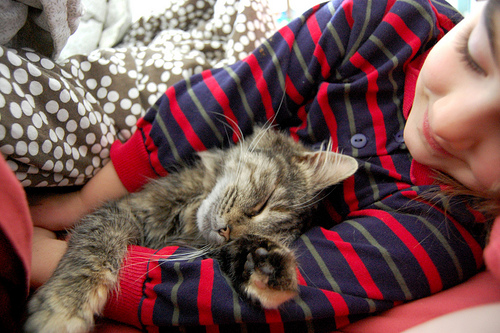 "Might I not be able to love God
in the ways that Katie was loving me?
. . . . Was this not exactly what I longed for--the experience of
stretching out, so to speak, on the breast of God, purring in
contentment, safely supported by the everlasting arms?"
"Might I not be able to love God
in the ways that Katie was loving me?
. . . . Was this not exactly what I longed for--the experience of
stretching out, so to speak, on the breast of God, purring in
contentment, safely supported by the everlasting arms?"--Don Holt, from Praying with Katie: God, my Cat, and Me. (See Deut. 33:27)
A Glimpse of the Peaceable Kingdom
Human Befriends BullThis gentle Ferdinand, rescued from a terrifying fate in the bull-ring, relaxes happily in a meadow as he gets spa treatment from a loving friend.
To view the clip, see "Ferdinand"
--Contributed by Lorena Mucke

Book Review: The Prince's Speech on the Future of Food
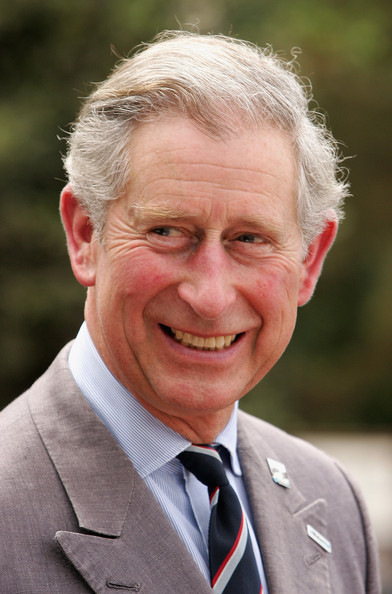 Charles, The Prince of Wales, The
Prince's Speech On the Future of Food. Foreword by Wendell
Berry. Afterword by Will Allen and Eric Schlosser. New York:
Rodale
Books, $6.99 paper, 46 pages.
Charles, The Prince of Wales, The
Prince's Speech On the Future of Food. Foreword by Wendell
Berry. Afterword by Will Allen and Eric Schlosser. New York:
Rodale
Books, $6.99 paper, 46 pages.
This is one of those books obviously notable not only for what it says, but for who says it. Prince Charles, heir apparent to the British throne, is newsworthy whatever he says, although not all his remarks have been universally acclaimed. Here, however, his reflections on agriculture and food, based on a talk given at Georgetown University, Washington, DC, in May of 2011, clearly evidence study, thought, and experience. Not just an armchair theorist, the prince has himself farmed for some twenty-six years, creating a model of sustainable organic agriculture. It may be hoped that his status will lend his conclusions about the future of food the wide circulation they deserve.
Charles' basic contention is that, to meet the ongoing needs of a growing world population, and prevent environmental degeneration, food production must be sustainable. It must not be dependent on fossil fuels and chemical fertilizers, pesticides, or growth-hormones introduced from outside the agricultural cycle. Instead, let it be organic agriculture. He is quite unconvinced by arguments claiming the whole world's population could not be so fed. He asks, “Why is it that an industrialized system, deeply dependent on fossil fuels and chemical treatment, is promoted as viable, while a much less damaging one is rubbished and condemned as unfit for the purpose?” (p. 17) It is the industrialized system which is in fact unsustainable, for it irreparably destroys the environment necessary for future production even as it temporarily makes food abundant enough that much of it is wasted. This anyone can see from the overfed garbage cans outside fast-food outlets and many a home. What is called for rather are policies that support sustainable farming which does not exceed the capacity of its local ecosystem, policies that penalize chemical and other pollution, ban the use of fertilizers from non-renewable sources, and promote universal healthy eating. We must change present policies fostering the "increasingly insane picture" in which "over a billion people are hungry" and "a billion people are now considered overweight or obese."
Charles' case is well-made so
far. But unfortunately it stops short of one conclusion of great
importance to the future of our earth and all its inhabitants: that we
must stop eating
animals: for the kind of long-term
sustainability he calls for, for the survival and health of animals, as
well as for the moral advance
of our race.
He does not even say that we humans must cut down, though that necessity is certainly implied in his firm rejection of animal agribusiness as unsustainable. Two pages have illustrations that emphasize his point. One shows a feedlot on the top, with cows crowded together on bare soil, stretching to the horizon; at the bottom of the page is a lush green field with ten or fifteen cows. Similarly, another page shows at the top thousands of chickens crowded into a vast room; at the bottom is a green field with a handful of chickens moving freely. Both the planet and the animals in question are undoubtledly much better off in the lower pictures. But the world population is rapidly approaching nine billions, as the prince acknowledges; and as more of them become affluent, they want "meat" like people in the rich nations. It does not take a Ph.D. in mathematics to see that tens of animals on large green fields simply will not provide flesh to satisfy this ballooning demand. And considering the well-established truth that animal agriculture contributes more than any other human source to global warming, the failure to urge a cutback cannot be excused.
The writing is clear and the points he
does make are vitally important ones, although insufficient. But
Charles is invested in helping British farmers improve
their methods of raising animals, and, unless he has a
life-transforming
mystical experience, we cannot expect him to promote vegetarianism at
all soon. But we may hope that before long he will at least begin
to make use of his prominent position to
encourage people to eat, in Michael Pollan's phrase, "mostly plants."
Book Review: The Exultant Ark
Jonathan Balcombe. The
Exultant Ark: A Pictorial Tour of Animal
Pleasure. Berkeley: Univ.
of Calif. Press. 2011. Hardcover, 224 pp. $34.95.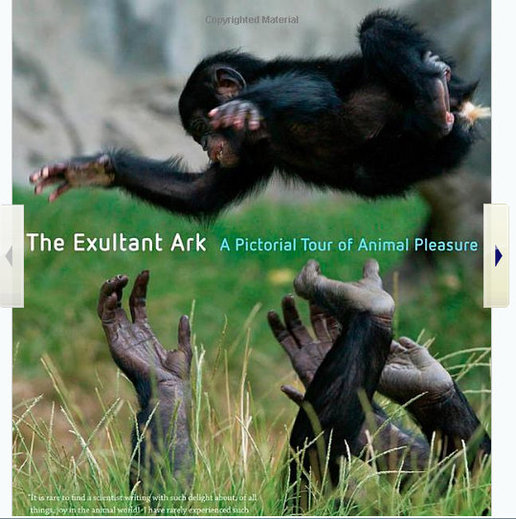 I cannot think of a
better way to convey the awe and
wonder of animals and their love of life than this priceless
book. The photo on
the cover says it all: lying in the green grass with only her
arms and legs showing, you see a bonobo mom playfully tossing her baby
up in the air. Joy, tenderness, personality, love—all these and
more are conveyed in a single photo. This beautiful book is
overflowing with photos of mammals, fish, amphibians, insects and birds
all demonstrating how very much like us they are and how well they
celebrate life and experience joy if only human beings will let them.
I cannot think of a
better way to convey the awe and
wonder of animals and their love of life than this priceless
book. The photo on
the cover says it all: lying in the green grass with only her
arms and legs showing, you see a bonobo mom playfully tossing her baby
up in the air. Joy, tenderness, personality, love—all these and
more are conveyed in a single photo. This beautiful book is
overflowing with photos of mammals, fish, amphibians, insects and birds
all demonstrating how very much like us they are and how well they
celebrate life and experience joy if only human beings will let them.As a former Senior Research Scientist at the Physicians Committee for Responsible Medicine, ethologist Jonathan Balcombe carries considerable weight in the scientific community. Yet he has demonstrated the courage to challenge the status quo in his work. He dives headfirst into the controversy. While most scientists still hold a narrow view of animal lives and tend to avoid the subjects of the emotions, motives, and personalities of animals, Balcombe asks the scientists and all of us to consider the richness and pleasures that animals can experience in their worlds.
This challenge has huge implications for a new world view in which we see animals as fellow travelers who enjoy (as the names of Balcombe’s chapters reveal): "Play"; "Food"; "Touch"; "Courtship and Sex"; "Love"; "Comfort"; "Companionship"; and many "Other Pleasures", just as we do. While many documentaries and texts propose that the lives of animals are simply a relentless struggle for survival, Balcombe shows us that by far the largest portion of the lives of unexploited animals is spent enjoying life. As he states, “…pleasure is central to animal existence.”
Balcombe delights readers with stories of larger animals playing gently with smaller ones so as not to hurt them, animals sharing and playing fair, animals grooming each other (including monkeys grooming a dog), clear indications of moral codes and empathy, and complex languages (for example, prairie dogs have signals-- “words”-- for different people, including “man with gun”).
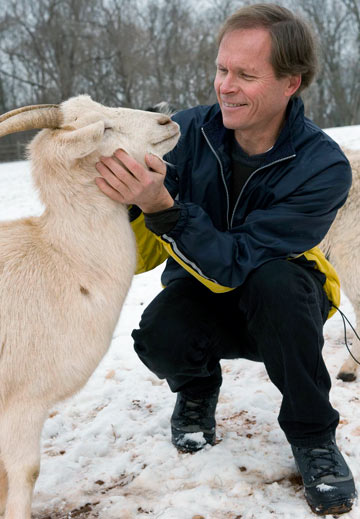 Balcombe
states that science is “mute” on the subject of love in
animals, but the evidence he shares to support the fact that animals do
experience love is very convincing, as the thousands of humans who
share our homes with companion animals know well. What we need to
do is expand
our hearts outward from seeing the love a dog has for us to
seeing the love other animals have for each other. In discussing
love between vultures, Balcombe states,”Vultures have
minds and emotions, and they live for decades. It is considered
unscientific to say that they enjoy each other’s company and to suggest
that they may fall in love. I think it is short-sighted and
cynical to pretend they don’t experience these feelings.”
Balcombe
states that science is “mute” on the subject of love in
animals, but the evidence he shares to support the fact that animals do
experience love is very convincing, as the thousands of humans who
share our homes with companion animals know well. What we need to
do is expand
our hearts outward from seeing the love a dog has for us to
seeing the love other animals have for each other. In discussing
love between vultures, Balcombe states,”Vultures have
minds and emotions, and they live for decades. It is considered
unscientific to say that they enjoy each other’s company and to suggest
that they may fall in love. I think it is short-sighted and
cynical to pretend they don’t experience these feelings.” The other side of love is loss. The author also points out that grief hormones released in women who have lost children are the same in baboons who have lost theirs. Regarding expressions of grief in elephants, Balcombe describes (p. 108) an incident among free elephants witnessed by expert observers:
".when Eleanor, the matriarch of a family unit called the First Ladies, became gravely ill and fell to the ground, she was aided by Grace, the matriarch of another family called the Virtues. Seeing her down, Grace ran over to Eleanor with her tail raised and temporal glands streaming secretions, sniffed and touched Eleanor with her trunk and foot, then used her tusks to help lift Eleanor to her feet. But the effort was ultimately unsuccessful, and during the week following Eleanor's death, elephants from five family units visited her body. There can be no question that elephants show deep emotional concern for others." He also notes that spindle cells, which are large neurons thought to be responsible in the human brain for empathy, love, and emotional suffering, have been discovered in the brains of other primates, whales and now elephants
I
do want to mention that some of the studies referred to in the book,
perhaps including the grief hormones in baboons, involved invasive and
cruel studies on animals. Balcombe noted the irony of one such
study in which mice were experimented upon and proved to show signs of
empathy, after which every mouse in the study was killed. This
may have proved that the mice had more capacity for empathy than the
researchers--although that result was probably not reported in the
literature. Let us do all we can to end all such invasive animal
experimentation, and continue instead to share observations of
evidence
proving again and again the depth and wonder of this “exultant ark.”
This book is a valuable tool for us to use in educating people who are still living in the lonely state of disconnection from the animal world. It is this very state that is causing human beings to continue to behave in such violent ways toward animals and the earth. If we perceive animals as having no feelings and being completely different from us, that allows us to justify the domination, enslavement, experimentation, exploitation, and killing of non-human animals. But there are dire consequences facing us all from this endless violence. Rather let us hold a vision of a vegan, peace-filled world in which we live in harmony on the earth with all beings. This noble book is helping us bring that vision into reality.
--Judy Carman, M.A.,
Author of Peace to All Beings: Veggie Soup for the Chicken’s Soul
and The Missing Peace: The Hidden Power of our Kinship with Animals
www.peacetoallbeings.com
Recipes
Chickpea-Red Quinoa SaladServes 4
1 cup dry chickpeas, soaked, rinsed and drained (see quick soak method)
1 cup red quinoa, rinsed
1 lb. bag frozen Organic Mediterranean vegetables
1/4 cup extra virgin olive oil
juice of one organic lemon
2 tsp. water
1/2 tsp. sea salt, or to taste
1/2 tsp. ground cumin
1/4 tsp. ground coriander
freshly ground black pepper, to taste
Cook chickpeas until tender. This may be done in a medium size saucepan with enough water to cover chickpeas by about one inch. Bring water to boil. Cover and reduce heat, cook until tender about 45 minutes - one hour. Set aside. Cook quinoa in a sauce pan with 2 cups water and 1/2 tsp. sea salt. Bring water to boil. Cover, reduce heat and cook on medium low heat until water absorbed, about 20 minutes. Set aside. Roast Mediterranean vegetables in 400 degrees F. oven for 22 - 24 minutes. In small bowl, whisk together olive oil, lemon juice, 2 tsp. water, sea salt, cumin, coriander and black pepper -- adding 1/4 to 1/2 tsp. sea salt to taste. Place chickpeas, red quinoa and vegetables in large salad bowl. Toss with dressing. Serve warm or at room temperature.
Quick Soak Method for Chickpeas:
Rinse chickpeas. Place in saucepan with water to cover by at least one inch. Place lid on top. Bring to boil over high heat. Reduce heat slightly, so that the water does not boil over and cause a mess on your range top. Allow to boil for 10 minutes with lid on. Remove from heat. Do NOT remove lid. Allow to soak in boiled water for about 2 hours. Drain and cook as directed.
-- Angela Suarez
Fresh Spinach Puree
Serves 4 - 6
1 lb. fresh baby spinach, cleaned
1/3 cup olive oil
juice of 1/2 organic lemon
1 clove garlic, peeled and chopped sea salt, to taste
freshly ground black pepper, to taste
Process spinach and garlic until finely chopped. Transfer to glass bowl. Add 1/4 cup olive oil and lemon juice. Blend for a couple of minutes until mixture forms a bright green paste. Season with salt and pepper and remaining olive oil. Serve with warm rustic Italian breads.
Poetry: Walter de la Mare, 1873-1956
Upon this leafy bush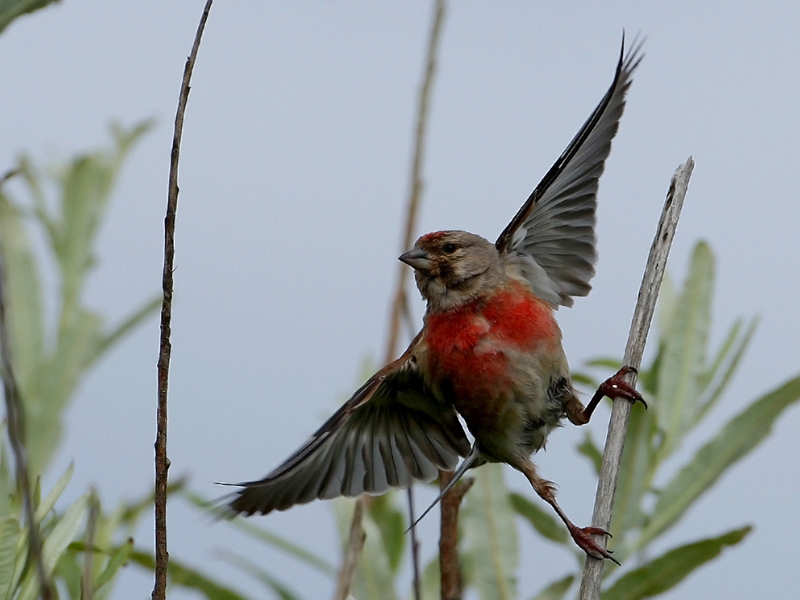
With thorns and roses in it,
Flutters a thing of light,
A twittering linnet.
And all the throbbing world
Of dew and sun and air
By this small parcel of life
Is made more fair;
As if each bramble-spray
And mounded gold-wreathed furze,
Harebell and little thyme,
Were only hers;
As if this beauty and grace
Did to one bird belong,
And, at a flutter of wing,
Might vanish in song.
The journal is intended to be interactive; contributions, including illustrations, are invited for the next issue. Deadline for the April issue will be March 27. Send to graciafay@gmail.com or 10 Krotona Hill, Ojai, CA 93023. We operate primarily online in order to conserve trees and labor, but hard copy is available for interested persons who are not online. The latter are asked, if their funds permit, to donate $12 (USD) per year. Other donations to offset the cost of the domain name and server are welcome.
Website: www.vegetarianfriends.net
Editor: Gracia Fay Ellwood
Book and Film Reviewers: Benjamin Urrutia and Robert Ellwood
Recipe Editor: Angela Suarez
NewsNotes Editors: Lorena Mucke and Marian Hussenbux
Technical Architect: Richard Scott Lancelot Ellwood
